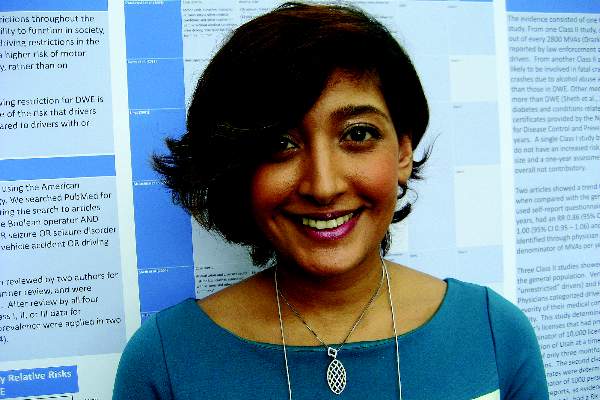User login
SEATTLE - It is unclear whether drivers with epilepsy have an elevated risk of motor vehicle accidents (MVAs), according to a systematic review reported at the annual meeting of the American Epilepsy Society. And conditions such as diabetes and cardiac problems appear riskier than epilepsy.
“Driving and epilepsy is an extremely controversial topic where we do have rules and regulations in place around the country, but they are really not based on any evidence, they are just based basically based on what the state legislature decides,” lead investigator Dr. Puja Naik commented in an interview.
“People walk around preaching about not driving for a year, not driving for 6 months [after the last seizure] for state regulations, but we don’t have anything that shows why they should or shouldn’t. It’s really important for the patient because quality of life can suffer from not being able to drive,” she added.
To determine whether the evidence supports driving restrictions, Dr. Naik and her colleagues systematically reviewed eight studies assessing the risk of MVAs among individuals with epilepsy. As classified according to American Academy of Neurology criteria, one study had class I (highest-quality) evidence, six had class II evidence, and one had class III evidence.
Results reported in a poster session showed that the relative risk of MVAs comparing drivers who did versus did not have epilepsy ranged from about 0.86 to 7.01 across the studies. The studies differed with respect to methods of MVA ascertainment, sample sizes, study durations, denominators used, and specific outcomes, noted Dr. Naik, who is a clinical neurophysiology fellow at the Hofstra North Shore–LIJ School of Medicine in Manhasset, N.Y.
Overall, two of the studies found trends toward a decreased rate of MVAs among drivers with epilepsy, but both used self-reports. “If it’s self-reported, then how objective can the evidence be, because patients may not want to identify themselves as having accidents on the road because then that will restrict their driving,” she commented. Three studies found an increased risk for epileptic drivers.
“It’s really important to have the appropriate methodology,” Dr. Naik asserted, endorsing use of a rigorous measure of driving exposure (such as the actual number of miles driven instead of the holding of a driver’s license or simple person-year of time) and a rigorous measure of MVAs (such as emergency department records giving International Classification of Diseases codes).
In other results of note, one study found that seizure-related crashes were rare, accounting for just 1 in every 2,800 MVAs (Mayo Clin. Proc. 2003;78:819-25). And another found that the rate of fatal crashes due to alcohol and alcoholism was 156 times higher and the rate due to conditions such as diabetes or cardiac disease was 26 times than that due to epilepsy (Neurology 2004;63:1002-7).
The investigators did not assess antiepileptic drug use or compliance, acknowledged Dr. Naik, who disclosed that she had no relevant conflicts of interest. “We were looking simply for the history of epilepsy or having an epilepsy disorder and whether or not it increases your risk, and we couldn’t conclude…in one particular way or the other based on this information,” she said.
SEATTLE - It is unclear whether drivers with epilepsy have an elevated risk of motor vehicle accidents (MVAs), according to a systematic review reported at the annual meeting of the American Epilepsy Society. And conditions such as diabetes and cardiac problems appear riskier than epilepsy.
“Driving and epilepsy is an extremely controversial topic where we do have rules and regulations in place around the country, but they are really not based on any evidence, they are just based basically based on what the state legislature decides,” lead investigator Dr. Puja Naik commented in an interview.
“People walk around preaching about not driving for a year, not driving for 6 months [after the last seizure] for state regulations, but we don’t have anything that shows why they should or shouldn’t. It’s really important for the patient because quality of life can suffer from not being able to drive,” she added.
To determine whether the evidence supports driving restrictions, Dr. Naik and her colleagues systematically reviewed eight studies assessing the risk of MVAs among individuals with epilepsy. As classified according to American Academy of Neurology criteria, one study had class I (highest-quality) evidence, six had class II evidence, and one had class III evidence.
Results reported in a poster session showed that the relative risk of MVAs comparing drivers who did versus did not have epilepsy ranged from about 0.86 to 7.01 across the studies. The studies differed with respect to methods of MVA ascertainment, sample sizes, study durations, denominators used, and specific outcomes, noted Dr. Naik, who is a clinical neurophysiology fellow at the Hofstra North Shore–LIJ School of Medicine in Manhasset, N.Y.
Overall, two of the studies found trends toward a decreased rate of MVAs among drivers with epilepsy, but both used self-reports. “If it’s self-reported, then how objective can the evidence be, because patients may not want to identify themselves as having accidents on the road because then that will restrict their driving,” she commented. Three studies found an increased risk for epileptic drivers.
“It’s really important to have the appropriate methodology,” Dr. Naik asserted, endorsing use of a rigorous measure of driving exposure (such as the actual number of miles driven instead of the holding of a driver’s license or simple person-year of time) and a rigorous measure of MVAs (such as emergency department records giving International Classification of Diseases codes).
In other results of note, one study found that seizure-related crashes were rare, accounting for just 1 in every 2,800 MVAs (Mayo Clin. Proc. 2003;78:819-25). And another found that the rate of fatal crashes due to alcohol and alcoholism was 156 times higher and the rate due to conditions such as diabetes or cardiac disease was 26 times than that due to epilepsy (Neurology 2004;63:1002-7).
The investigators did not assess antiepileptic drug use or compliance, acknowledged Dr. Naik, who disclosed that she had no relevant conflicts of interest. “We were looking simply for the history of epilepsy or having an epilepsy disorder and whether or not it increases your risk, and we couldn’t conclude…in one particular way or the other based on this information,” she said.
SEATTLE - It is unclear whether drivers with epilepsy have an elevated risk of motor vehicle accidents (MVAs), according to a systematic review reported at the annual meeting of the American Epilepsy Society. And conditions such as diabetes and cardiac problems appear riskier than epilepsy.
“Driving and epilepsy is an extremely controversial topic where we do have rules and regulations in place around the country, but they are really not based on any evidence, they are just based basically based on what the state legislature decides,” lead investigator Dr. Puja Naik commented in an interview.
“People walk around preaching about not driving for a year, not driving for 6 months [after the last seizure] for state regulations, but we don’t have anything that shows why they should or shouldn’t. It’s really important for the patient because quality of life can suffer from not being able to drive,” she added.
To determine whether the evidence supports driving restrictions, Dr. Naik and her colleagues systematically reviewed eight studies assessing the risk of MVAs among individuals with epilepsy. As classified according to American Academy of Neurology criteria, one study had class I (highest-quality) evidence, six had class II evidence, and one had class III evidence.
Results reported in a poster session showed that the relative risk of MVAs comparing drivers who did versus did not have epilepsy ranged from about 0.86 to 7.01 across the studies. The studies differed with respect to methods of MVA ascertainment, sample sizes, study durations, denominators used, and specific outcomes, noted Dr. Naik, who is a clinical neurophysiology fellow at the Hofstra North Shore–LIJ School of Medicine in Manhasset, N.Y.
Overall, two of the studies found trends toward a decreased rate of MVAs among drivers with epilepsy, but both used self-reports. “If it’s self-reported, then how objective can the evidence be, because patients may not want to identify themselves as having accidents on the road because then that will restrict their driving,” she commented. Three studies found an increased risk for epileptic drivers.
“It’s really important to have the appropriate methodology,” Dr. Naik asserted, endorsing use of a rigorous measure of driving exposure (such as the actual number of miles driven instead of the holding of a driver’s license or simple person-year of time) and a rigorous measure of MVAs (such as emergency department records giving International Classification of Diseases codes).
In other results of note, one study found that seizure-related crashes were rare, accounting for just 1 in every 2,800 MVAs (Mayo Clin. Proc. 2003;78:819-25). And another found that the rate of fatal crashes due to alcohol and alcoholism was 156 times higher and the rate due to conditions such as diabetes or cardiac disease was 26 times than that due to epilepsy (Neurology 2004;63:1002-7).
The investigators did not assess antiepileptic drug use or compliance, acknowledged Dr. Naik, who disclosed that she had no relevant conflicts of interest. “We were looking simply for the history of epilepsy or having an epilepsy disorder and whether or not it increases your risk, and we couldn’t conclude…in one particular way or the other based on this information,” she said.
AT THE ANNUAL MEETING OF THE AMERICAN EPILEPSY SOCIETY
Key clinical point: Collectively, the data neither strongly supported nor refuted a higher risk of MVAs for drivers with epilepsy.
Major finding: The relative risk of MVAs for drivers with versus without epilepsy ranged from 0.86 to 7.01.
Data source: A systematic review of eight studies of MVA risk among drivers with epilepsy.
Disclosures: Dr. Naik disclosed that she had no relevant conflicts of interest.

